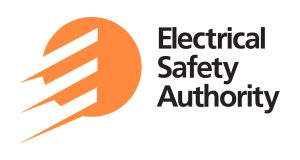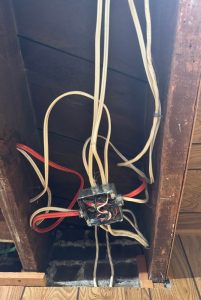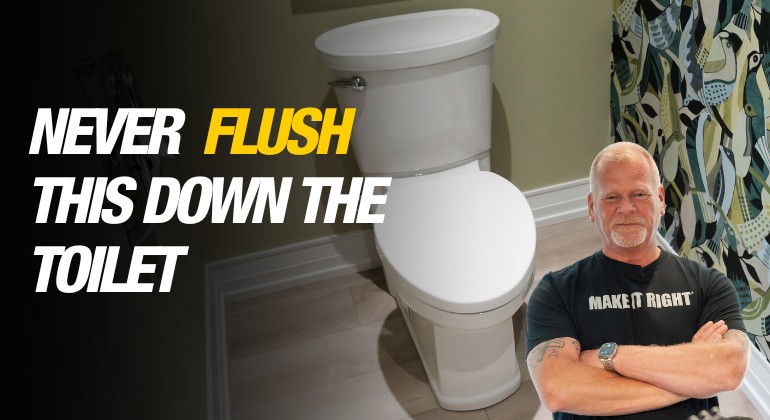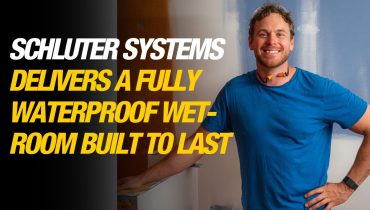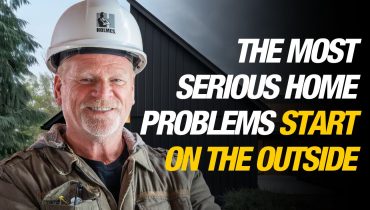I love exploring new technology—especially when it genuinely improves how we work in construction—and I recently came across one that truly impressed me, iGUIDE by Planitar Inc. In my...
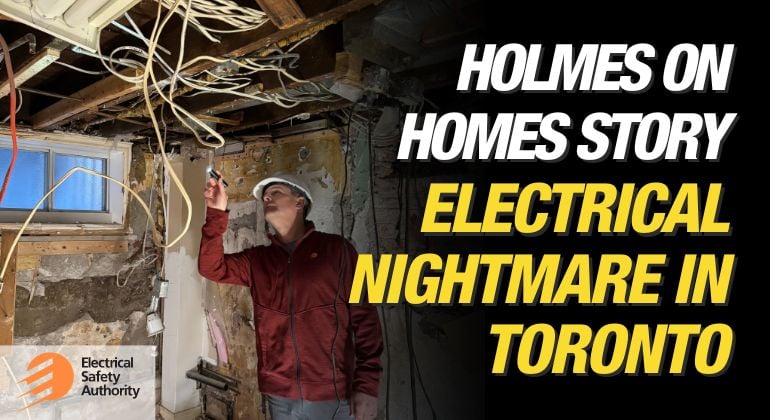
A Holmes on Homes Story: Electrical Nightmare in Toronto
By Mike Holmes
Mike’s Advice / Buying & Selling Your Home
Monday, October 7th, 2024 @ 3:14pm
How Safe is Your Home from Electrical Hazards?
I’ve been doing what I’m doing for over 40 years, and the most common problem I come across in my jobs is electrical issues. Sometimes homeowners think they can rewire their house. Sometimes it’s a friend who offers to do a panel swap. And sometimes the wrong products are installed. Electrical work can be dangerous (and deadly) if it’s not done correctly. That’s why we always pull the right permits and bring in licensed electrical contractors.
I recently took on a project for an elderly woman in Toronto. The house has been through a few renovations and a basement flood. Walking through the house, I quickly noticed some electrical issues. I’m a general contractor, not an electrical contractor, so we brought in Trevor from The Electrical Safety Authority to do a full inspection and tell us about the state of the electrical. I will never forget what he said – “I’m surprised this house hasn’t burnt down”. You NEVER want to hear those words!
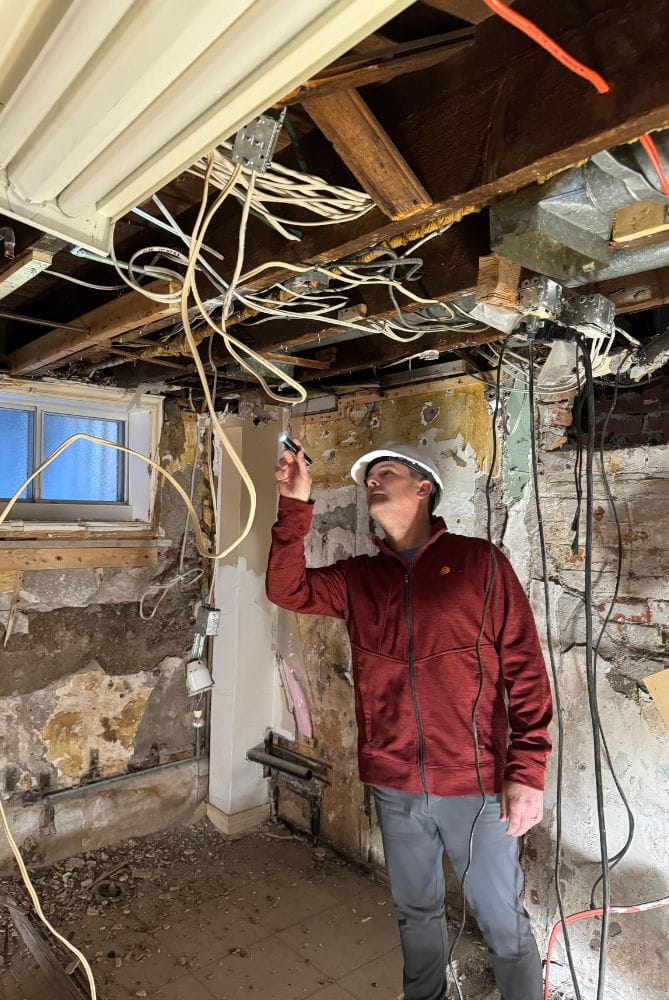
The electrical in this house was so bad, Trevor – the Electrical Inspector from the Electrical Safety Authority was shocked at how an electrical fire hadn’t already started.
Here are some shocking discoveries from this episode of Holmes on Homes:
No Recent Permits
In most areas, you can do a permit search on the property to see if permits were pulled for renovations. In this particular case, the only permit Trevor from ESA found on this house was for a panel swap in 2008. It was clear that no permits were pulled for the other electrical work. That usually means the work was NOT done by a licensed electrical contractor.
A lot of people aren’t aware that they need an electrical permit. In Ontario, it is the law to pull electrical permits. This is different from your building permits. The only way to get electrical permits in Ontario is through the Electrical Safety Authority.
Note: The Electrical Safety Authority is there for OUR benefit. They can identify safety issues and non-compliance with code. Think about how much you spent on buying a house. The cost of doing it right and keeping your family safe from electrical hazards is very small.
Electrical Permits in Ontario
Here’s what you need to know about notifications (“permits”) and electrical inspections.
- File a Notification of Work with ESA.
- Request an Inspection.
- Obtain the ESA Certificate of Inspection.
Mixed Wiring
We found several instances of mixed wiring methods in the basement, this is one of the most common electrical issues I saw on our job sites.
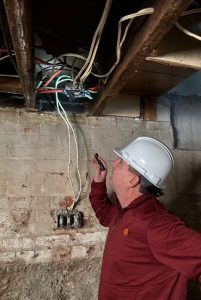
Trevor from The Electrical Safety Authority is inspecting electrical issues on our job site
When you mix wiring like copper and aluminum, and it’s not properly connected using the proper marrettes and the proper devices, it will actually burn up. This is a huge fire hazard!
Note: It’s always good to have a licensed electrical contractor come in and do an assessment on your system like tightening all the screws in your panel, making sure all the joints are nice and tight, checking your receptacles, and identifying other issues.
That’s why I love working with the Electrical Safety Authority on our jobs. They show up, they tell us what’s wrong, and they do an inspection after the job is complete, and they issue us a Certificate of Acceptance. This is for the safety of the occupants of the house.
Knob And Tube Wiring
Knob and tube are typically safe when it’s not disturbed. But in this house, there is a knob and tube in the basement where people hang stuff off the ceiling. The insulation can fall off, creating an electrical shock.
Note: Knob and tube wiring is safe, provided it is properly maintained by a Licensed Electrical Contractor. Check out this information on Knob and Tube wiring by the Electrical Safety Authority.
Junction Boxes
We have electrical boxes with no covers, and cut-off wires sticking out of the connectors. The live parts were exposed so we have live parts just hanging out. If you make contact with the live conductors and the box, it can send you to the hospital.
Note: Junction boxes require a cover plate to be installed. Electrical devices and their wire connections must be enclosed in an electrical box.
Laundry Sink Near Electrical Panel
There is a laundry sink by the electrical panel. I don’t like seeing a panel close to a water source. It seems that the sink wasn’t always there. Perhaps this was a part of a renovation that was previously done in the house. You need 1m clearance in front of an electrical panel.
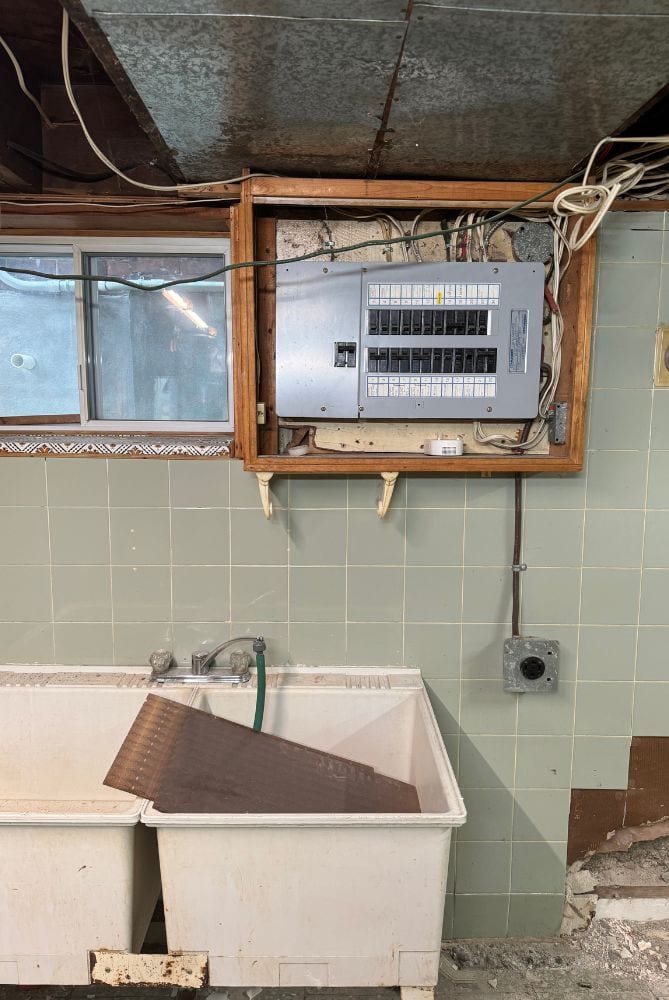
A laundry sink by the electrical panel
Corroded Receptacles
The receptacles in the basement looked awful. I noticed this right away. They are corroded, probably as a result of water issues in the basement. This was concerning for me because when the flood happened, the homeowners were in the basement, removing the water themselves, and the receptacles could have been submerged in water.
We did a complete rewire and a panel swap in this house with my friend Frank (a licensed electrical contractor). I am telling this story because it’s a good lesson for all homeowners out there who are renovating their homes and touching their electrical. Don’t mess around with things you don’t know, and bring in the right pros!
DIY Electrical Work
In Ontario, a homeowner IS allowed to do the electrical work on their own house. I don’t recommend this, because you could be putting your house and family in a dangerous situation. If you do your own electrical work, it still has to be reviewed by the Electrical Safety Authority.
Incorrect wiring, faulty connections, or improper installations can lead to serious hazards like electrical fires, electrocution, or equipment damage. Many DIYers may not be familiar with local building codes or safety standards.
As a DIY-er, you may not be able to uncover hidden issues such as overloaded circuits or improper grounding. Electrical work should be left to licensed professionals who have the expertise to ensure that installations are safe, legal, and reliable.
Hiring A Licensed Electrical Contractor in Ontario
The only way to be sure electrical work is safe and legal is to hire a Licensed Electrical Contractor (LEC), who has the expertise, equipment, and training to do the job safely. Don’t mess around with things you don’t know. Your general contractor is not allowed to do your electrical work.
RELATED
Hiring a Licensed Electrical Contractor in Ontario: When And How
When it comes to your home, safety should always come first, especially with electrical work. I’ve seen firsthand the risks that come with cutting corners or trying to do it yourself. It’s not worth the potential dangers lurking in your walls. Always bring in a licensed electrical contractor to handle the job right, and don’t forget to pull the necessary permits. It’s about protecting your family and your investment.
Regular inspections are key to catching issues before they turn into nightmares. Remember, your home should be a place where you feel safe, not one filled with hidden hazards. So take the right steps to keep it that way—your loved ones deserve it!
RELATED
5 Electrical Safety Tips When Buying A New Home
6 Things To Know Before Installing An EV Charger In Your Home In Ontario
